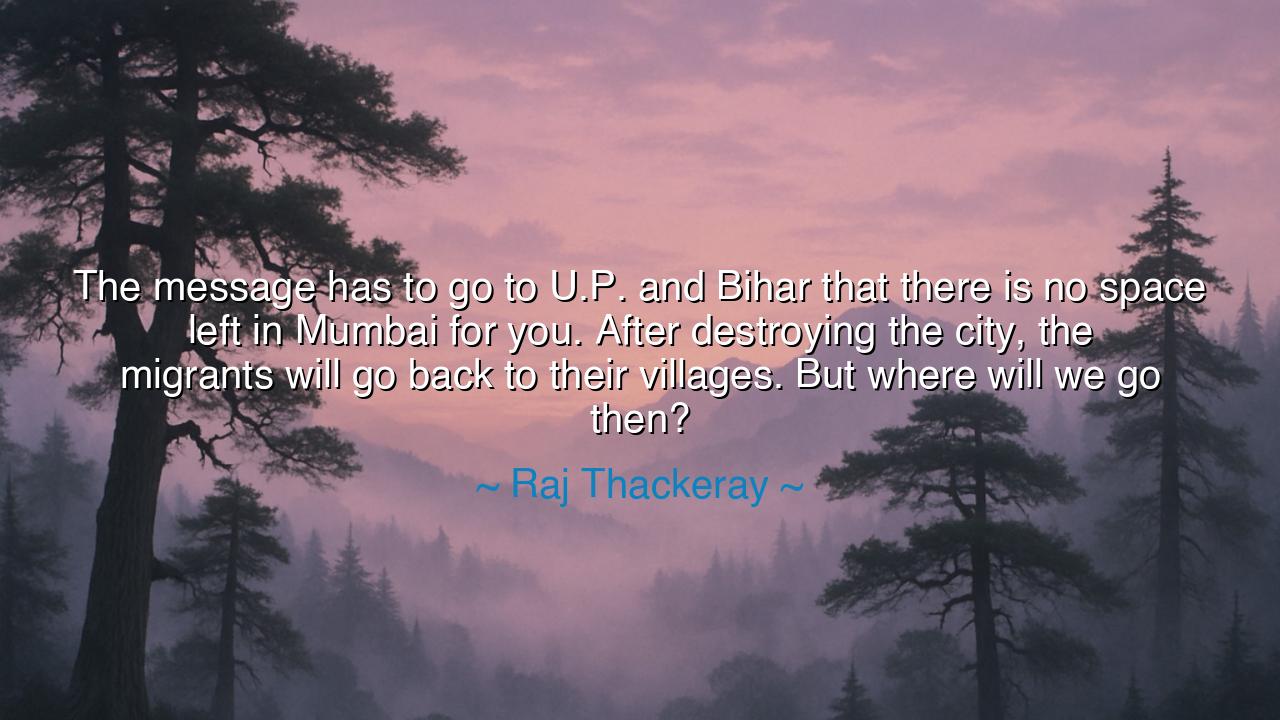
The message has to go to U.P. and Bihar that there is no space
The message has to go to U.P. and Bihar that there is no space left in Mumbai for you. After destroying the city, the migrants will go back to their villages. But where will we go then?






Hear the words of Raj Thackeray, spoken with fire and born of grievance: “The message has to go to U.P. and Bihar that there is no space left in Mumbai for you. After destroying the city, the migrants will go back to their villages. But where will we go then?” These words rise not in calm reflection, but in the heat of conflict, born from the struggles of a city overflowing, where opportunity and survival wrestle daily. They reveal a truth both ancient and modern—that when resources seem scarce and cities seem overwhelmed, the fear of displacement grips the hearts of those who call the land their home.
For what is space, in this saying, but more than physical ground? It is belonging, livelihood, the chance to thrive in the city one has built, defended, and cherished. Thackeray speaks for those who feel their roots entwined with Mumbai, who see waves of migrants as both contributors and rivals, builders and destroyers. His words capture the timeless cry of the native who fears being overshadowed, who fears that the soil of his birth may no longer sustain him if divided endlessly among strangers.
History is filled with such struggles. Consider the tale of Rome, when migrants and conquered peoples streamed into the empire’s capital. To some, they brought labor, diversity, and strength; to others, they brought chaos, competition, and fear of ruin. The Roman citizen often asked, “What place is left for us?” Their anxiety, like Thackeray’s, was not merely about numbers, but about identity—about who truly belongs, and what happens when the city’s bounty cannot stretch to all.
And yet, let us also remember the other side of this tale. For migration itself is as old as mankind. Every people, once, was a stranger in a strange land. The workers from Bihar and U.P. sought Mumbai not to conquer, but to survive, to earn bread, to find light where their villages offered only darkness. Just as millions once left Europe to build new lives in America, so too do migrants move toward cities of promise. In their striving, they strengthen the very city they are accused of burdening. The paradox is eternal: the hand that builds may also be seen as the hand that threatens.
Thackeray’s words thus capture not only anger, but also the fear of loss—loss of home, loss of work, loss of place. His lament, “But where will we go then?” reveals the heart of the struggle: when the city changes beyond recognition, where shall its original children belong? This is the cry of countless peoples through history, from the Native Americans of old to the indigenous communities of modern cities. It is the cry of rootedness threatened by change.
The lesson, O seeker, is not to dismiss such fears, nor to condemn them outright, but to see the deeper truth: all must find ways to share space without destroying one another. To carve out belonging while honoring the belonging of others. To acknowledge that cities thrive when they are both homes for the native and harbors for the newcomer. The challenge is not whether migration shall exist—it always has—but how justice, compassion, and order can govern it.
In your own life, remember this teaching: when you feel threatened by the presence of another, ask not only, “What will I lose?” but also, “What can we build together?” Guard your roots, yes, but do not let fear make you blind to the shared humanity of those who come seeking light. For the city is strongest not when it divides itself, but when it learns to hold many within its walls.
So let Thackeray’s fiery words be heard as both a warning and a summons: “There is no space left in Mumbai for you.” They remind us that space is not only physical—it is emotional, cultural, spiritual. To hold it, one must balance protection with generosity, fear with courage, memory with vision. And the true greatness of a people lies not only in defending their ground, but in shaping a city where belonging is broad enough to endure the tides of change.






AAdministratorAdministrator
Welcome, honored guests. Please leave a comment, we will respond soon